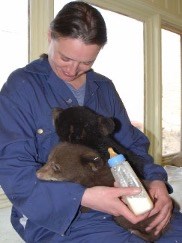Catriona Matheson has been awarded a Queen Elizabeth II Platinum Jubilee Medal in recognition of her work rehabilitating wildlife at the Cochrane Ecological Institute (CEI).
Matheson is a director and volunteer at the Rocky View County-based facility, and she has been caring for injured animals for as long as she can remember.
The platinum jubilee medal is another in a long list of accolades already on the award shelf at the CEI. Her inspiration comes from her mom, the institute’s founder Clio Smeeton, who has been recognized internationally for a lifetime of work in the field.
In her other life, she is Sgt. Matheson, a recruiter with The Canadian Armed Forces in Calgary. It was her colleagues there who nominated her for the medal.
The Queen’s medals are awarded to Albertans for significant contributions to the province. It is an acknowledgement and celebration of the work and commitment of people who give of themselves in service to their communities.
Matheson is familiar with the lifestyle of a military family, having moved often as her father pursued a career in mining.
“We did weird things – my parents were travelling all over the world, my mom was doing wildlife everywhere,” she said.
Her mother was collecting animals for the Calgary Zoo in Africa when she met Matheson’s father, and that was where Catriona was born and lived until she was one year old.
She lived briefly in Spain, Portugal, and the U.K. before moving to British Columbia at the age of five.
Matheson also called the Northwest Territories home for a time, before finally settling at the wildlife facility northwest of Cochrane in 2002.
A prior volunteer firefighter in Yellowknife, she is no stranger to helping others – two-legged or four.
Projects at the CEI often include injured birds needing help over winter, or until they’ve recovered enough to find food on their own.
This winter, Matheson’s clients include a cedar waxwing that failed to migrate, and a merlin and a goshawk, both of which arrived with broken wings.
Most recently, a bald eagle was brought in after having been wedged into the grill of a vehicle near Sundre. It was taken to Fen Vet in Airdrie for surgery and is coming along nicely. The staff at CEI do not give animals names unless (and until) they’re sure they’re going to survive.
The eagle hasn’t been named yet.
“Right now we’re force-feeding it, so hopefully it’ll start eating on its own, because it’s stressful for everybody,” Matheson said.
As she talked about other experiences and wildlife behaviours, Matheson’s love of animals came through in both her words and tone of voice.
“Animals are just amazing,” she said.
In 1971, Smeeton began breeding swift foxes from a single pair she received from a woman in Colorado, who had taken possession of them from a trapper in South Dakota. Their efforts helped establish a small, self-sustaining population in southern Alberta and Saskatchewan. The reintroduced foxes tripled in number, making it one of the most successful endangered species reintroduction programs in the world.
Smeeton’s work at the CEI with the swift fox program garnered international attention, prompting other countries to send wildlife experts to Cochrane to train under her.
Just like her mother, Matheson’s enthusiasm about animals is infectious, but she admitted she’s disturbed by the state of wildlife rehabilitation in Alberta. She doesn’t understand why the province doesn’t take more responsibility for the file.
“It always frustrates me that my mom was instrumental in bringing the first successful breeding and release rehabilitation program in the world – in Canada – and it’s something that is recognized everywhere else,” she said.
“The public expects wildlife to be looked after by the government. They think we’re run by the government, and we’re not, and they don’t do enough to recognize her. I’ve got 40 years experience – she’s got more. She has an amazing amount of knowledge, she’s an asset, she’s a treasure that’s just being ignored.”
The CEI survives on charitable donations and the occasional grant – there is no provincial funding. All the income from the attached Happy Tails pet kennels goes towards running the rehabilitation centre.
For more information on the work of the CEI, go to ceiwildlife.org.



